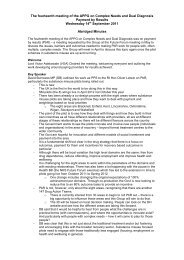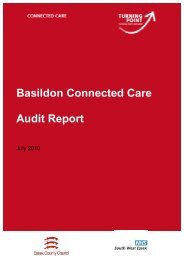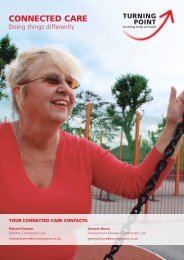Citizen Advisors - Turning Point
Citizen Advisors - Turning Point
Citizen Advisors - Turning Point
You also want an ePaper? Increase the reach of your titles
YUMPU automatically turns print PDFs into web optimized ePapers that Google loves.
<strong>Turning</strong> <strong>Point</strong> Connected Care Report 19<br />
Despite these views, individuals and families were extremely appreciative of the<br />
support received and there was evidence that LAC had made a positive<br />
difference to their lives; for example, in relation to increased inclusion, choice<br />
and both formal and informal support.<br />
There is a concern in Scotland that the LAC model is losing some of its<br />
community based element by focusing too much on service provision. In a<br />
report commissioned by In Control it is suggested that the Scottish LAC model<br />
has placed an overemphasis on access to formal services at the expense of<br />
encouraging people with learning disabilities to engage with the local<br />
community. It is argued that “LAC is a community based model”, however,<br />
“some Local Area Coordinators in Scotland have become very service focused”.<br />
This may be because the Local Area Coordinators have more experience and<br />
knowledge in helping people to access services, and they know relatively little<br />
about the local communities of which their clients are a part. However, it may<br />
also be due to how the model was implemented by the individual authority.<br />
Either way, it is an important point to consider, as it implies that the service<br />
delivery model utilised in some areas of Scotland may actually be removed from<br />
the original Local Area Coordination model. Furthermore, it suggests that the<br />
training of Local Area Coordinators is crucial and that knowledge of the local<br />
community is paramount.<br />
Moreover, echoing the sentiments in Western Australia, there is a concern that<br />
the Local Area Coordination model in Scotland has suffered from a lack of<br />
clarity, and that users and agencies in the community have little understanding<br />
of the role, its purpose and how it can add value.<br />
3.3 North East of England<br />
Building on the success of the scheme in Australia and Scotland, the Local Area<br />
Coordination model has also been adopted by two local authorities in the northeast<br />
of England: Darlington and Middlesbrough. These two projects commenced<br />
in 2010 and are in the early stages.<br />
The LAC project in Middlesbrough places a large emphasis on prevention and<br />
personalisation. The scheme aims to support people identified with low level<br />
needs to gain access to community support to prevent them from having to<br />
access more significant or statutory support in the future. The project<br />
emphasises the importance of strengthening community capacity, and attempts<br />
to steer people away from engaging with costly and in demand statutory<br />
services, and instead directs them towards support in the community and<br />
building bridges with family members.<br />
The project is also committed to fulfilling the personalisation agenda, and is part<br />
of the Putting People First programme in Middlesbrough. By simplifying the<br />
system for clients and bridging the gap between existing services, the LAC<br />
project gives individuals more choice and control over the support they receive.<br />
The project will employ two Local Area Coordinators to cover three deprived<br />
areas of Middlesbrough. The Local Area Coordinators are expected to have a
















